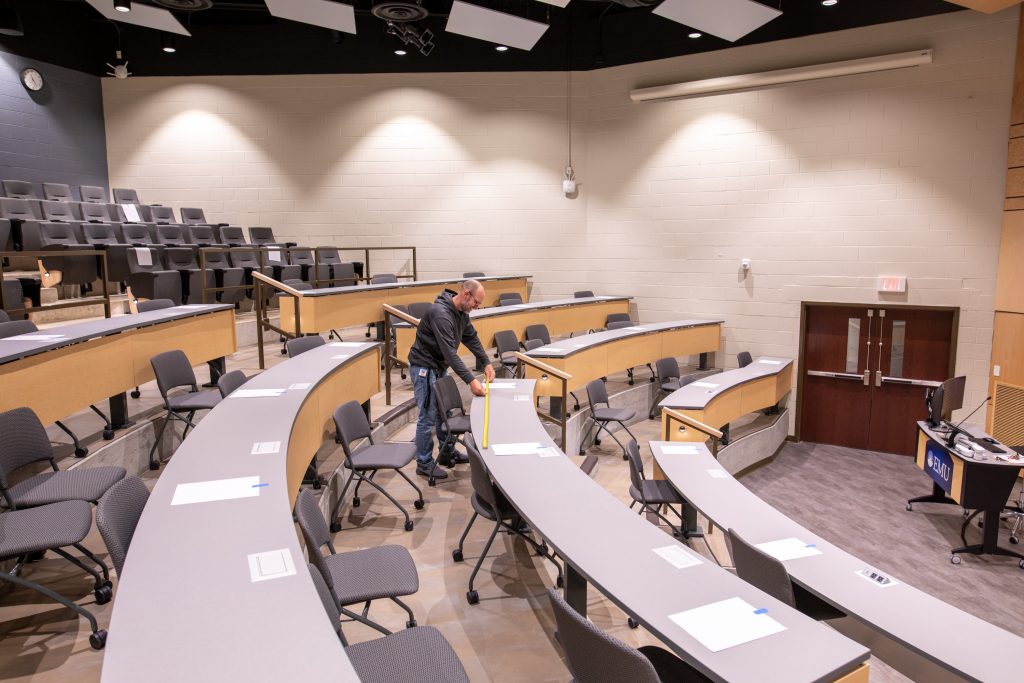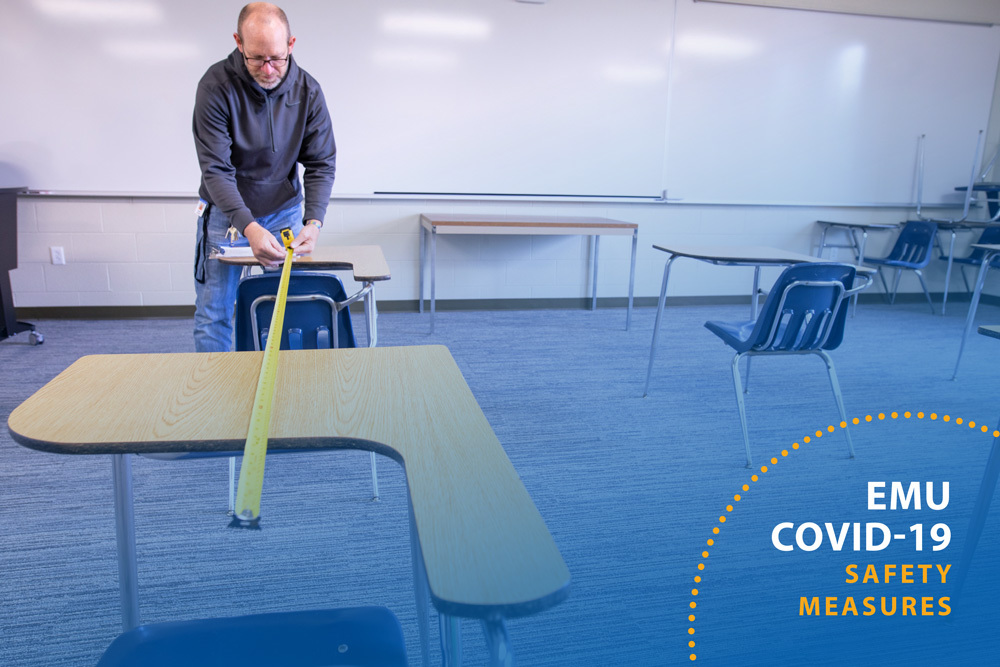A recent admissions event for incoming students at Eastern Mennonite University drew historic numbers — and among those listening, surely some breathed a sigh of relief when President Susan Schultz Huxman announced that the university expects to open campus for in-person classes in fall semester 2020.
“We understand there are many questions about the future, some that even we cannot answer yet, but we are making a strong commitment that the pandemic will not diminish EMU’s ability to deliver exemplary teaching and caring community support for our students in fall 2020,” said Huxman.
Any one of several learning environments may be adopted in the fall, she said, with health and safety of students being the top priority and the decision dependent on the status of COVID-19 in the region and the recommendations of health and educational authorities.
Notably, in a survey during the last week of spring semester classes, students gave EMU faculty and staff a 94 percent positive rating for the exemplary care received in and out of the classroom, Huxman said. “EMU has a reputation as a strong, caring educational community, and this response from our students is a real vote of confidence for all of us. Even in uncertain and challenging times, we’ve all witnessed that our shared commitment to supporting and nurturing each other is stronger than ever.”

EMU’s location, away from densely populated regions, and its small size — with related flexibilities in programming, scheduling, residential life and special attentiveness to supporting the individual student — are also advantageous at this time, Huxman said.
The university continues to assess the budget impacts of COVID-19 on its current and incoming students, higher education, and the local, regional and national economy. CARES Act funding allotted to EMU was dispersed earlier this summer to qualified students. Two funds — the renamed UFund for Resilience and the new Student Tuition Relief Fund — drew record donations during the university’s annual LovEMU Day, yet another affirmation from the broader community of support for EMU’s mission and sustainability.
Planning for fall semester began in April. Approximately 60 administrators, faculty, staff and students are collaborating on six teams to address university operations, including enrollment, teaching and learning, student life, faculty and staff, budget, and infrastructure. The teams are specifically tasked with contingency planning in their areas, from the best-case scenario of progressive, consistent improvement and lowering infection rates through the summer and fall, to a middle-case scenario of late resurgence in the fall, and finally, the worst-case scenario of ongoing waves of resurgence.
The planning process has included, and will continue to include, input from various internal constituencies — faculty, staff, students, parents, board of trustees. In addition, EMU leaders continue to consult with community leaders as well as peer private universities in the Commonwealth and other higher education institutions in the Valley, including significant conversation and guidance from state educational and elected officials. EMU continues to follow guidelines from the Center for Disease Control and Prevention and the Virginia Department of Health, as well as Sentara RMH and the City of Harrisonburg.
More details will be released in the coming weeks. The following are general updates across campus.
Incoming Class of 2024 on target
EMU’s incoming class numbers are on track to exceed last year’s numbers, according to Vice President of Recruitment and Innovation Jason Good. “We’re very excited about the incoming class and committed to working with parents and students as they process the complex factors related to attendance.” A few interesting stats related to this class:
- Students represent 15 states;
- One-third are first-generation college students;
- 40 percent are athletes, and
- Nursing and biology programs continue to be top draws.
Residence Life focusing on health measures
Staff in Residence Life are focusing their attention on developing health and safety measures in conjunction with new guidance released last week by The American College Health Association, specific to housing occupancy, residential life, social gatherings, and dining hall practices, among other topics.
With health and safety, affordability is also a priority, according to Dean of Students Shannon Dycus. “Many, if not all students will have access to the option of single occupancy with no extra charge,” she said, adding that students can still live with a roommate with additional agreements regarding risk.
Staff are hosting “town hall”-style events this summer, in conjunction with the Student Government Association, to keep students updated on developing new protocols and planning around health and safety issues. Also at the forefront of staff time is planning new ways to engage and welcome first-year students through orientation and transition to campus life.
As with every new academic year, the value of building strong community among all students “is what gives EMU life,” Dycus said. “Engaging our students in leadership, shared values, personal well being, and social accountability matters and that will not change in the coming weeks and months.”
Athletics at work on fall plans
In conjunction with plans to open for the fall semester, athletics administrators, coaches and staff are also preparing for the start of the fall athletic season. “We are committed to providing the best student-athlete and team experience possible in the given circumstances,” said Director of Athletics Dave King. “Programming will require a higher threshold of safety practices and most likely, a different format and schedule than in the past.” The Old Dominion Athletic Conference, of which EMU is a member, is developing schedules and post-season options for a variety of scenarios.
EMU can also conduct contests with other institutions outside the conference. Best practices and recommendations from health officials are being considered about issues related to conducting athletics including practice formats and scheduling, transportation, visiting teams, locker rooms, testing, tracing, and training room use, among other issues, King said.
Flexible instructional formats, new tech
The infrastructure and academic committees are working on management of classroom space to minimize exposure and maximize social distancing practices. Committee members, in conjunction with the Provost’s Office, are planning flexible instructional formats to enable continuity of teaching in response to changing health needs of faculty, staff, and students. Faculty members and academic leaders are working this summer to design courses that will maintain EMU’s high academic standards while offering easy flexibility for individual needs and changing public health requirements, said Provost Fred Kniss. Classroom technology setups are also being adjusted to facilitate greater flexibility and support for student learning.

We hope and pray that you will have a successful reopening.